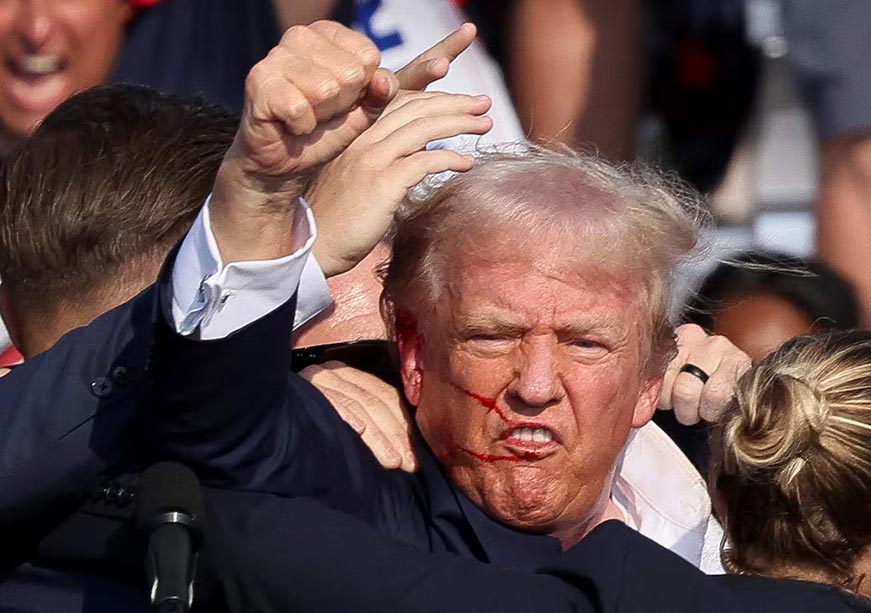-
CENTRES
Progammes & Centres
Location
In the last four decades, however, attempts to assassinate presidents or presidential nominees had seemed relegated to the past.

Over the years, cinematic adaptations depicting famous US presidential assassinations have heightened the mythic connection between American presidents and attempts on their lives. Throughout history, the assassinations of four US presidents — Abraham Lincoln, James Garfield, William McKinley, and John F Kennedy — loom large in the national memory. Other presidents, such as FDR, Harry Truman, Gerald Ford, and Ronald Reagan, also endured assassination attempts.
In the last four decades, however, attempts to assassinate presidents or presidential nominees had seemed relegated to the past. That perception dramatically shifted on July 14 when a bullet pierced Donald Trump’s ear while he stood on stage during an election rally in Butler, Pennsylvania. This chilling incident serves as a stark reminder that historical patterns can resurface unexpectedly, underscoring the enduring vulnerability of US presidents to violence. In its repercussions, the latest attack could have a vastly different political impact, leading up to the national elections in November. Already, the image of a bloodied Trump face and a fist pump has become a symbol of survival and resilience the world over, resonating as far as China. The event could play out in in myriad ways in the American political milieu.
The image of a bloodied Trump face and a fist pump has become a symbol of survival and resilience the world over, resonating as far as China.
For the Republicans, particularly presidential nominee Trump, there exists a unique opportunity to turn the attack into political sympathy. Heading into last week’s Pennsylvania rally, Trump held a lead over Joe Biden in the polls, 44% to 40%. The assassination attempt on Trump is expected to influence the campaign’s trajectory, albeit marginally. Even before the incident, Trump had been gaining a slight edge over Biden, especially in rural America. Much hinges on how Trump’s campaign managers capitalise on this opportunity and how the Biden team responds to a potential Trump resurgence following the attack. Biden’s swift denouncement of the attack and any political violence may have set the appropriate tone.
The assassination attempt on Trump has prompted a reset within the Democratic Party. Biden cancelled a trip to Texas and had to revise both his and his party’s messaging in advertising and communications. President Biden is still recovering from a lacklustre performance in the first presidential debate against Trump on June 27, sparking intense debate over whether he should remain the Democratic presidential nominee. The attack on Trump has the potential to divert attention from the intense scrutiny of Biden’s candidacy. Additionally, Biden is likely to be overshadowed by the upcoming Republican National Convention (RNC) in Milwaukee, Wisconsin.
For the Biden team, the challenge will be to prevent the gap between him and Trump from widening further, especially as contrasting images are likely to influence voters: a bloodied yet defiant Trump rebounding, versus Biden whose mental sharpness and candidacy have been questioned. As part of his post-debate strategy, Biden has sought to revive his image as a resilient candidate fit for the presidency, stating, “When you get knocked down, you get back up,” though this sentiment serves as a pun for Biden and a reality for Trump now.
The impact of the attack in our digital age is expected to differ significantly from previous incidents. While it has bolstered Trump’s candidacy and momentarily tempered Democratic criticism of Trump, one of its most notable effects has been rallying support for Trump from influential figures like Tesla CEO Elon Musk and Bill Ackman, the millionaire hedge-fund manager.
The fact that the attack on Trump has happened in the digital age, and one of social media, can amplify the repercussions of political violence and convert it into advantage for Trump and disadvantage for Biden. There is a groundswell of fear and anger among Trump supporters, which the Republican party will look to tap into at the RNC from July 15-18. The Republican Party is expected to witness a more united front going into the RNC, which would be an extremely useful strategy for the phase between Trump’s nomination and the elections in November. The political and ideological consolidation around Trump within the Republican Party is expected to work in the party’s favour by tempering the Grand Old Party’s image as increasingly fractious with internal dissensions around his candidacy. For Trump, the intra-party consolidation couldn’t have come at a better time.
The political and ideological consolidation around Trump within the Republican Party is expected to work in the party’s favour by tempering the Grand Old Party’s image as increasingly fractious with internal dissensions around his candidacy.
In his post-debate strategy, Biden had raised the rhetoric heat against Trump, calling him “Putin’s puppy” and “It’s time to put Trump in the bull’s-eye”. The attack on Trump has enforced a scaling back of Biden’s upping-the-ante strategy. Biden’s strategy of pause and reflect before going forward is a strategy which factors concerns of a deeply divisive American society and an acknowledgement of the growing chasm within. Biden’s decision to “cool” the rhetoric down is intended to prevent the voters’ sentiments from being swayed towards Trump. Biden’s call to Trump following the incident is an attempt to revert to political civility, even as America is turning into a uninspiring political story.
As dramatic as the assassination attempt was, it is likely to significantly bolster voter sentiment in favour of Trump. However, November 5 is still months away, and an effective Biden strategy could mitigate Trump’s unintended gains. Prior to the June 27 presidential debate and the July 14 assassination attempt, Biden’s prospects seemed steady, closing the gap with Trump in polls. Moreover, the Democratic Party had united behind Biden, while Trump appeared entangled in internal disputes and funding divisions within the Republican Party. The fortunes of the Democratic and Republican Parties seem to have reversed compared to just a few months ago.
This commentary originally appeared in Financial Express.
The views expressed above belong to the author(s). ORF research and analyses now available on Telegram! Click here to access our curated content — blogs, longforms and interviews.

Professor Harsh V. Pant is Vice President – Studies and Foreign Policy at Observer Research Foundation, New Delhi. He is a Professor of International Relations ...
Read More +
Vivek Mishra is Deputy Director – Strategic Studies Programme at the Observer Research Foundation. His work focuses on US foreign policy, domestic politics in the US, ...
Read More +